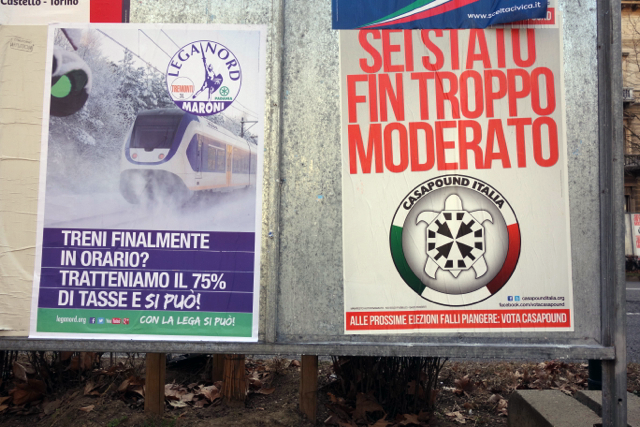The polls confirmed his instincts were correct. Singing the praises of Il Duce on Holocaust Memorial Day proved to be a smart decision. Now only five points behind frontrunner Pier Luigi Bersani, Silvio Berlusconi’s popularity with voters was unharmed. With a population of less than thirty thousand, in a country of over sixty million, Italy’s Jewish community doesn’t count. Even worse, according to a number of analysts, a good many will likely vote for Il Cavaliere, anyway.
What gives? Are Italians as willing to forgive Mussolini as Berlusconi? Foreign newspapers are rife with speculation. Il Duce has always been a folk hero. De-Nazification never happened. Fascism is making a comeback. Everyone has a similar explanation on offer. As noir as they all are, there’s something unsatisfying about them. Not the elements of truth they disclose (they are all valid.) Rather, it’s that that they take such conclusions at face value, without asking why.
Could it be, for example, that Italy’s democracy is ailing? Might it always have? How could the hegemony of Silvio Berlusconi, over national politics, for nearly two decades, have impacted Italian valuations of democratic politics? What about the ex-Prime Minister’s ownership of the country’s major media outlets? Could his dominance be enough to inspire a sense of resignation, that Italians have no room to do anything but support a status quo they have little control over?

As a propagandistic motif, perhaps that’s fascism’s value. The more we insist it wasn’t so bad, the more we invoke cultural moments associated with its rule, the more we can rationalize the unjust present. The two photos, included in this edition of Randomizer, certainly suggest as much. The first, an election poster from Italy’s Northern League (allies of Berlusconi) drops the Mussolini meme once again. “Are the trains on time, finally?,” the poster rhetorically asks.
The second, photograph, of graffiti, on the southernmost side of Turin’s Molinette hospital, leaves few doubts. “I lost my memory,” it states, in Italian. Sandwiched in between a number of Swastikas, the graffiti suggests it was written after the fact. The fact, that is, of the Nazi symbols, which most likely preceded the commentary. South Turin is full of such rightwing street art, included posters from the likes of neo-Nazis CasaPound, whose poster sits to the right of the train image.
“Sei stato fin troppo moderato,” (You were too moderate,) it reads. A critique of Berlusconi, perhaps, and his willingness to pick black players for his football team? What about his willingness to play the electoral game? Who knows. The statement’s ambiguity has many references, which doubtless serve its intended purpose. As ‘Italian’ as this all might read – par for the course, same as it ever was, not to be taken seriously, etc – there’s still no excusing this kind of politics.
Mussolini may make a good marketing figure, for sure. However, the more we promote it, the more voters will eventually demand the real thing. Not a wealthy media executive, or hysterical anti-immigration advocacy, but a more militant, unambiguous rightwing politics consistent with those of Il Duce. That’s what the CasaPound poster’s statement is there to remind us of. And why, as the Molinette graffiti says, we’ve shouldn’t lose our memory of fascism.
Photographs courtesy of the author





